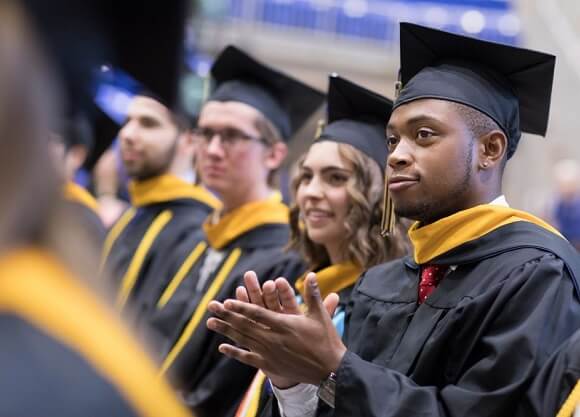
Speaker urges engineering graduates to leave a legacy of inclusion
May 20, 2018

May 20, 2018

An accomplished project manager at Pratt & Whitney, Gerken was awarded an honorary doctor of humane letters degree at the evening ceremony. Alexander Clark, an entrepreneur, philanthropist and programmer, also was awarded an honorary doctor of humane letters.
For Gerken, her remarks were an opportunity to reflect on the past and to seize the future.
“Inclusivity is more than just saying it. It’s the actions you take to make the folks around you feel like their opinion matters, their perspective is important,” Gerken said. “Visible diversity is important, because you can see it, but it’s not all that matters. Diversity of age, education, socio-economic background, religion, physical ability — all of those make us the unique individuals we are.”
In today’s fast-paced environments, Gerken said, workplace teams need to function at a high level and solve problems quickly, collaboratively and from all perspectives.
“An engineered object, process or whatever doesn’t know anything about the person who designed or developed it,” she said. “That’s the beauty of the field of engineering — anyone can engineer anything and the product doesn’t care. The issues arise when the engineers themselves aren’t fully diverse. They can’t see all the perspectives, can’t appreciate the differences in all of us that make our thoughts unique and results in a better product.”
Gerken told the graduates they can start leaving a legacy of inclusion immediately.
“You should start your careers knowing that you can leave a legacy wherever you are, and in whatever role you have, all the while striving to be inclusive,” Gerken said.
School of Engineering Dean Justin Kile reassured the Class of 2018 that they are well prepared to navigate the years ahead.
“As we turn to your future, I see endless possibilities and look forward to watching you tackle the grand challenges of our world,” Kile said. “These challenges range from re-engineering the brain to securing our safety to enhancing our infrastructure.”
“As computer scientists and engineers, you will play a vital role in solving these problems and many others yet to be identified,” Kile said. “We look to you to tackle these challenges and enhance the world we all live in.”
Janine Jay '18 delivered the Response of the Class of 2018.
“We now face some new challenges; we are being handed a world full of insurmountable road blocks that no one has found a solution for,” said Jay. “This may seem impossible and frustrating but it’ll be OK, because I know my peers and we are not imposters. We’ve gone from freshmen with potential to graduates with years of growth and success to prove that we can take any problem head on.”
The School of Engineering Commencement was the final of six undergraduate ceremonies the university hosted on May 19 and 20. In all, there were 1,626 undergraduate degree candidates from six schools:
353 in the College of Arts and Sciences
430 in the School of Business
186 in the School of Communications
65 in the School of Engineering
440 in the School of Health Sciences
217 in the School of Nursing
In addition, Quinnipiac awarded a total of 1,244 degrees to graduate, law and medical students on May 12 and 13.
Quinnipiac is a dynamic, three-campus university where professors who want to know students by name come to teach, and where students who want a personal, challenging education come to learn.
Located in Southern New England, Quinnipiac’s top-rated academics, low faculty-to-student ratio and Division I athletics are just some of the reasons why it is consistently ranked among the best universities by U.S. News & World Report and The Princeton Review. It is one of 100 universities to have both a law school and a medical school with the opening of the Frank H. Netter MD School of Medicine in 2013, and its Polling Institute is respected by media organizations around the globe.
Faculty members are experts in their fields and generous with their time. The university enrolls 7,000 full-time undergraduate and 3,000 graduate and part-time students in 110 degree programs through its Schools of Business, Communications, Education, Engineering, Health Sciences, Law, Medicine, Nursing and the College of Arts and Sciences.
Throughout its rich history, Quinnipiac has remained true to its three core values: high-quality academic programs, a student-oriented environment and a strong sense of community.
Quinnipiac Today is your source for what's happening throughout #BobcatNation. Sign up for our weekly email newsletter to be among the first to know about news, events and members of our Bobcat family who are making a positive difference in our world.
Sign Up Now